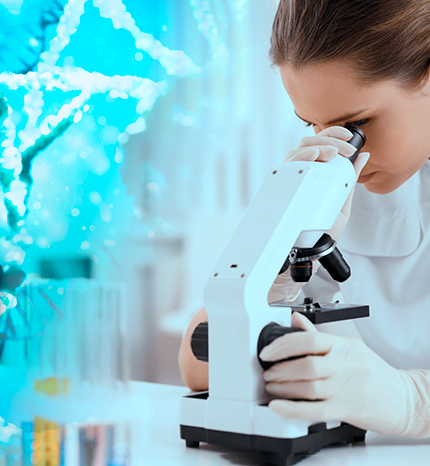

MSc / PGDip Molecular Biology
MSc: £8,388
PGDip: £5,988
Enrolment Fee: £560
Accredited as a top-quality online, distance, and blended learning.
Our programme is tailored to help eligible individuals.
Flexible part – time distance learning.
Opportunity for 60 to 300 hours of internships.
MSc: 180 CAT (90 ECTS)
PGDip: 120 CAT (60 ECTS)
Programme Description
This Postgraduate programme equips you with the knowledge and skills essential for professional success in this thriving sector. Our programme provides thorough training in cutting-edge techniques, laboratory safety protocols, analytical methods, and advanced topics such as nucleic acids and protein analysis. You’ll also develop mastery in cell culture, microscopy, and data interpretation, all of which are crucial for success in this field.
Who is this for?
Entry requirement: a bachelor’s degree or equivalent.
This Postgraduate in Molecular Biology is ideally suited to those who want to develop a professional future within:
- Academic and Research Institutions.
- Biotechnology and Biomedical companies.
- Pharmaceutical industry.
- Genomics and Genetics Laboratories.
- Pharmacogenomics and Personalized medicine.
- Clinical Research Organizations.
- Healthcare and Clinical Laboratories.
- Quality Control and Assurance.
- Forensic Science.
- Agri Biotechnology.
- Environmental and Conservation Organizations.

Syllabus
As your journey progresses, you will discover different modules which will help you, step by step, to reach your final goal.
1. Equipment and lab material
2. Basic techniques of lab
3. Cleaning, Disinfection and Sterilization
4. Bibliographic searches in PubMed
5. Basic concepts in statistics
6. Laboratory Safety Standards
7. Physical risks
8. Chemical risks
9. Biological risks
1. DNA
2. RNA
3. Purification, quantification and separation of nucleic acids
4. DNA extraction from routine samples
5. Genes and genome
6. Chromosomes
7. Study of the chromosomes
8. Mutations and polymorphisms
9. Cell division
10. DNA replication and repair
11. Transcription
12. Translation
13. Control of gene expression in prokaryotes
14. Control of gene expression in eukaryotes I
15. Control of gene expression in eukaryotes II
16. Epigenetics
17. PCR
18. Recombinant DNA technology
19. Sequencing
20. Nucleic acid hybridisation
21. Gene therapy
Part I
1. Structure and function of proteins
2. Importance of Molecular Biology receptors and antibodies
3. Protein qualification
4. Separation techniques and protein analysis
5. Chromatography
6. ELISA
7. Western-blot
8. Other immunological techniques
9. Proteomics
Part II
10. The cell
11. Cell growth techniques
12. Microscopy techniques for cellular studies I
13. Microscopy techniques for cellular studies II
14. Microscopy techniques for cellular studies III
1. Introduction
2. Historical background
3. Database
4. Comparative genomics
5. Functional genomics
6. Sequence analysis and protein structure
7. Bioinformatics applied to the study of protein expression: proteomics
Student Reviews
Students who select our programme are employed here:


Payment Options
Invest in your future and spread the cost with our flexible payment options. Secure your place on our programme today with a minimal deposit.
Educational Partners
We share our journey with companies who hold same values as us in order to give our students greater opportunities for growth, both professionally and personally.
Accreditations
Our BAC and University of Chichester (UK) accreditation ensures exceptional education. BAC endorses our online and blended learning, while University of Chichester accredits our MSc’s programmes, boosting employability and CATS credits recognition
Choose your path with our Exclusive Programme
- 100% flexible distance learning
- Flexible Payment Options
- Financial Aid Available
- Level 7 qualification
- Recognised Accreditations
- MSc: 180 CAT (90 ECTS)
PGDip: 120 CAT (60 ECTS) - Optional Internships













